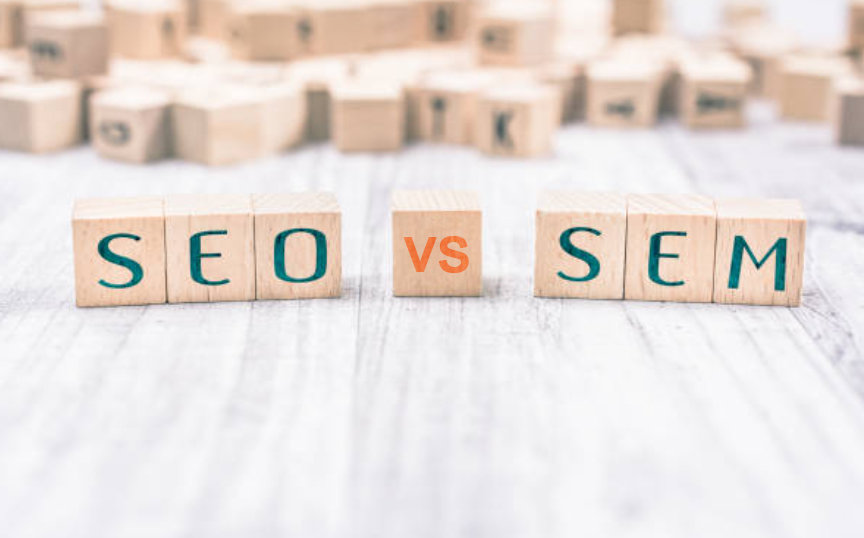SEO vs SEM: Which Delivers the Best ROI?
In the e-commerce world, there’s an ongoing debate: SEO or SEM? Which is the key to unlocking your online store’s most significant return on investment? Before we get to that let’s better understand what SEO and SEM are.
SEO (Search Engine Optimization)
SEO encompasses many techniques to make a website more appealing to search engines. The primary objective of SEO is to improve a site’s organic rankings in search engine results pages (SERPs), leading to increased visibility and traffic. To achieve this, various website elements, like its content, structure, and backlink profile, must be optimized. This strategy requires patience and persistence, as organic growth doesn’t provide immediate results. However, its long-lasting effects make it a valuable investment. Unlike many forms of digital advertising, SEO doesn’t involve paying for placements directly. Instead, hiring SEO Experts who know the ropes often involves costs. Some companies internally manage their websites.
SEM (Search Engine Marketing)
SEM is a broader digital marketing tactic that encapsulates both organic and paid strategies to enhance a site’s visibility on search engines. The most recognizable form of SEM is PPC (Pay-Per-Click), where advertisers bid to have their ads appear in the sponsored results section of search engines. With SEM, businesses can control their ad placements by setting budgets, targeting specific keywords, and deciding on audience demographics. This approach provides immediate visibility and can be particularly effective for new websites or promotions that require quick results. While SEM offers quicker visibility compared to SEO, it requires continuous investment. Once an ad campaign ends or if the budget runs out, the visibility of those ads ceases.
ROI in SEO: The Organic Growth Powerhouse
One of the initial questions potential clients often pose is about the return on investment they can expect from SEO. When done correctly, SEO is known to deliver substantial ROI. It can be a primary catalyst for attracting new clients.
- Long-Term Value: SEO is a marathon, not a sprint. While it may not deliver immediate results like SEM, it offers sustained traffic growth over time. Once you achieve high rankings, it’s relatively easier to maintain them with minimal investment, offering a higher ROI in the long run.
- Trust & Credibility: Organic search results tend to be viewed as more trustworthy by consumers. This trust translates into higher conversion rates. This is proven by the fact that 94% of people skip over search ads, trusting organic search to provide a reliable service.
- Cost-Effectiveness: Unlike SEM, where costs can rise with competition and market fluctuations, SEO is less susceptible to these changes. So, the cost of acquiring a customer through organic search often remains steady or even decreases over time.
SEM: The Fast Track to Visibility
SEM, particularly PPC advertising, has its strengths:
- Immediate Traffic: SEM can offer instant visibility if you’re launching a new e-commerce site or promoting a limited-time offer.
- Targeting Precision: With SEM, you can target specific demographics, locations, and even times of the day. Platforms like Google Ads offer a level of granularity that’s hard to match with organic SEO alone.
- Budget Control: You can set a daily budget and monitor the exact ROI of every dollar spent. This way you can determine the cost compared to income and determine what keywords to best target.
Balancing the Act: SEO and SEM Together
Here’s an insight, not every business owner realizes: SEO and SEM can coexist, complementing each other.
- Keyword Insights: Running SEM campaigns can provide invaluable data on which keywords convert best. SEO experts can then optimize for these keywords, ensuring you dominate both organic and paid results.
- Landing Page Optimization: SEM requires creating high-converting landing pages. These same principles can be applied to organic landing pages, boosting the overall site’s performance.
Making a choice: Which is Right for You?
SEO offers the best ROI for the long term by offering sustained growth, especially when you factor in the cumulative benefits over time. It creates a solid foundation, driving consistent traffic without the ongoing costs associated with SEM.
However, this doesn’t mean SEM has no place in your strategy. For immediate results or targeting particular demographics, SEM is indispensable.
A wise strategy often involves starting with SEM for immediate traffic while concurrently building your SEO. As organic traffic grows, you can gradually decrease SEM spend, increasing overall ROI.
In the clash of SEO vs. SEM, there’s no all correct answer. However, for businesses seeking sustained, cost-effective growth, the ROI in SEO is hard to beat. As SEO experts, we aim to harness this organic powerhouse for your e-commerce platform, ensuring you reap the rewards of increased visibility, trust, and long-term growth.
Considering integrating SEO into your e-commerce strategy? Reach out and let’s maximize your ROI together.


